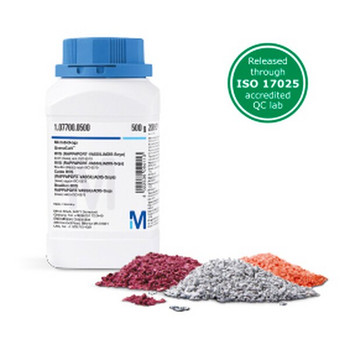Description
Chloramphenicol ≥98% (HPLC)
Synonym: D-(−)-threo-2,2-Dichloro-N-[β-hydroxy-α-(hydroxymethyl)-β-(4-nitrophenyl)ethyl]acetamide, D-(−)-threo-2-Dichloroacetamido-1-(4-nitrophenyl)-1,3-propanediol, D-threo-2,2-Dichloro-N-[β-hydroxy-α-(hydroxymethyl)-4-nitrophenethyl]acetamide, Chloromycetin
-
CAS Number 56-75-7
-
Linear Formula Cl2CHCONHCH(CH2OH)CH(OH)C6H4NO2
-
Molecular Weight 323.13
-
Beilstein/REAXYS Number 2225532
-
EC Number 200-287-4
-
MDL number MFCD00078159
-
PubChem Substance ID 24892250
-
NACRES NA.76
Properties
| Related Categories | A - K, Antibacterial, Antibiotics, Antibiotics A to Z, Antibiotics by Application,
Antibiotics by Mechanism of Action, Antibiotics A-F, Biochemicals and Reagents, Chemical Structure Class, Core Bioreagents, Genetic Marker Selection, Interferes with Protein Synthesis, Life Science Reagents for Cell Culture, Phenicoles, Research Essentials, Spectrum of Activity
Less... |
| Quality Level | 300 |
| assay | ≥98% (HPLC) |
| form | powder or crystals |
| pKa | 5.5 |
| mp | 148-150 °C (lit.) |
| Mode of action | protein synthesis | interferes |
| antibiotic activity spectrum | Gram-negative bacteria |
| - | Gram-positive bacteria |
| - | mycobacteria |
| - | mycoplasma |
| storage temp. | room temp |
| SMILES string | OC[C@@H](NC(=O)C(Cl)Cl)[C@H](O)c1ccc(cc1)[N+]([O-])=O |
| InChI | 1S/C11H12Cl2N2O5/c12-10(13)11(18)14-8(5-16)9(17)6-1-3-7(4-2-6)15(19)20/h1-4,8-10,16-17H,5H2,(H,14,18)/t8-,9-/m1/s1 |
| InChI key | WIIZWVCIJKGZOK-RKDXNWHRSA-N |
| Gene Information | human ... CYP1A2(1544) |
General description
Chemical structure: phenicole
Application
Chloramphenicol is a synthetic antibiotic, isolated from strains of Streptomyces venezuelae. It is often used for bacterial selection in molecular biology applications at 10-20μg/mL and as a selection agent for transformed cells containing chloramphenicol reistance genes.
Chloramphenicol has been used as a bacteriostatic non potent antibiotic.[1] It has been used for the selection/growth of positive bacterial cells.[2][3]
Packaging
1 kg in poly bottle
5, 25, 100, 500 g in poly bottle
Biochem/physiol Actions
Mode of Action: Chloramphenicol inhibits bacterial protein synthesis by blocking the peptidyl transferase step by binding to the 50S ribosomal subunit and preventing attachment of aminoacyl tRNA to the ribosome. It also inhibits mitochondrial and chloroplast protein synthesis and ribosomal formation of (p)ppGpp, de-pressing rRNA transcription.
Mode of Resistance: Use of chloramphenicol acetyltransferase will acetylate the product and inactivate it.
Antimicrobial Spectrum: This is a broad spectrum antibiotic against gram-positive and gram-negative bacteria, and is used mainly for ophthalmic and veterinary purposes.
Caution
Stock solutions should be stored at 2-8°C and are stable at 37°C for 5 days. Aqueous solutions are neutral and stable over a wide pH range, with 50% hydrolysis occurring after 290 days. Use of a borax buffered solution reduces this number to 14%. Solutions should be protected from light as photochemical decomposition results in a yellowing of the solution. Heating aqueous solutions at 115°C for 30 minutes results in a 10% loss of chloramphenicol.
Preparation Note
Degradation of chloramphenicol in aqueous solution is catalyzed by general acids and bases. This rate of degradation is independent of the ionic strength and pH.
Other Notes
Keep container tightly closed in a dry and well-ventilated place.





